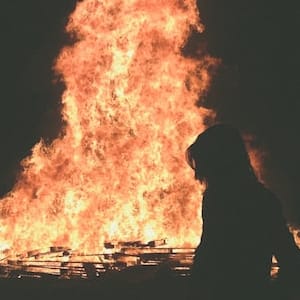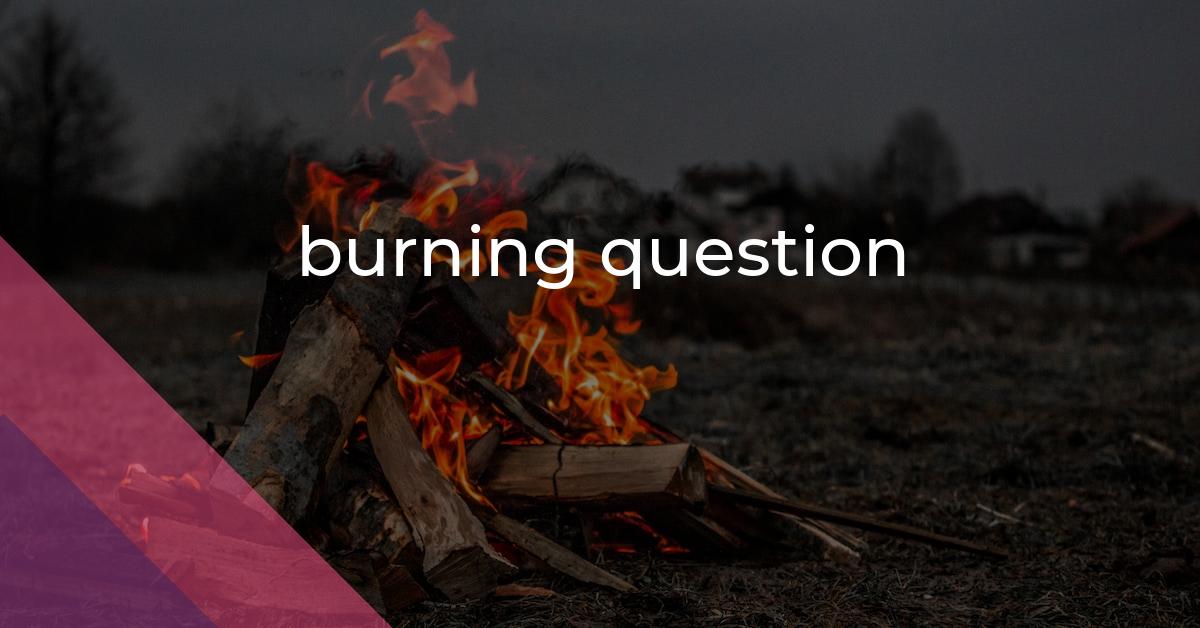burning question: Idiom Meaning and Origin
What does ‘burning question’ mean?
The idiom "burning question" refers to a pressing or urgent inquiry that one is eager to have answered.

Idiom Explorer
The idiom "want to know," often used in question form, expresses a strong desire or curiosity to obtain information or gain knowledge about something.
The idiom "ears are burning" is used when you get the feeling that someone is talking about you, often in a negative or gossiping way.
The idiom "do a slow burn" means to feel angry or resentful, but to suppress or hide one's anger or frustration.
The idiom "cut to the chase" means to get to the main point or most important part of something without wasting time or providing unnecessary details.
The idiom "come to mention it" is used when someone suddenly remembers or brings up a particular topic or point during a conversation.
The idiom "catch fire" means to become popular, exciting, or successful very quickly.
When someone is *burning the candle at both ends*, they are living or working in a way that uses up all their energy and resources quickly. It suggests that they are pushing themselves too hard and not taking time for rest or self-care.
The idiom "burn that bridge when one comes to it" means to take a decisive action without considering the consequences, particularly with the intention of leaving no possibility of returning to a previous state or relationship.
The idiom "burn someone's ears" means to criticize or scold someone harshly, causing them to be embarrassed or upset.
Deciphering curiosity
The idiom "burning question" is a commonly used phrase in English that conveys the idea of a pressing or urgent issue that demands immediate attention or resolution. It is a phrase that captures the intensity and significance of a topic or problem, emphasizing its importance and the need for immediate action or response. The origin of this idiom is not explicitly known, but it has been in circulation since at least the late 19th century. The word "burning" in this idiom is used metaphorically, symbolizing the intensity or urgency of the question or issue at hand. Just like a fire that demands immediate attention to prevent further damage or destruction, a burning question requires immediate action or resolution.
The idiom "burning question" can be used in a variety of contexts. It is commonly employed in political debates, social conversations, or personal inquiries. When someone refers to a question as a "burning question," they are emphasizing its importance and the need for immediate attention. It is a way to capture the audience's attention and evoke a sense of urgency. So, when you hear someone say "I have a burning question," they are indicating that they have an important and pressing issue that they want to know the answer to right away.
When you want to know something urgently or have a pressing question, you can use the idiom "burning question" to describe your inquiry. For example, if you are attending a seminar and have a burning question about the topic being discussed, you can raise your hand and say, "Excuse me, I have a burning question about this. Can you please clarify XYZ?" By using this idiom, you are conveying your sense of urgency and emphasizing the importance of your question.
Another related idiom that involves the concept of burning and ears is "are your ears burning." This idiom is used to suggest that someone is being talked about or discussed, often in their absence. If someone says to you, "Hey, are your ears burning?" it means that they were just talking about you. This idiom is not directly related to the concept of a burning question, but it does involve the idea of something being on fire or ablaze. In this case, it's a metaphorical fire that symbolizes gossip or conversations happening behind someone's back.
Additionally, the idiom "burn out" has a different meaning altogether. It refers to a state of physical or mental exhaustion caused by excessive work or stress. When someone experiences burnout, they feel drained and overwhelmed, both physically and emotionally. This idiom is not directly related to the concept of a burning question, but it does involve the idea of burning or being consumed. In this case, it's a metaphorical burnout caused by excessive demands or pressure.
Similarly, the idiom "burn one's bridges" refers to a situation where someone intentionally destroys relationships or opportunities and makes it difficult to go back to a previous state. When someone "burns their bridges," they are cutting off all possibilities of returning to a previous situation or mending broken relationships. This idiom is not directly related to the concept of a burning question, but it does involve the idea of burning or destroying something, in this case, metaphorically.
The idiom "burning question" is widely used in the English language. It conveys the idea of a pressing or urgent issue that demands immediate attention or resolution. The origins of this idiom are uncertain, but it has been in circulation since at least the late 19th century. The word "burning" in this idiom is used metaphorically to symbolize the intensity or urgency of the question at hand. This idiom is commonly used in political debates, social discussions, and personal inquiries. When someone refers to a question as a "burning question," they are emphasizing its importance and the need for immediate attention. It is a way to capture the audience's attention and evoke a sense of urgency. Other related idioms, such as "are your ears burning," "burn out," and "burn one's bridges," involve the concepts of burning and destruction in different contexts. These idioms add depth and versatility to the English language, allowing for more expressive and nuanced communication.
Example usage
Examples of how the idiom *burning question* can be used in a sentence:
- She couldn't concentrate on her work because she had a burning question about the new project.
- During the Q&A session, a student raised their hand and asked the burning question everyone was thinking.
- After reading an intriguing article, he had a burning question that he wanted to discuss with his friends.
More "Language" idioms



